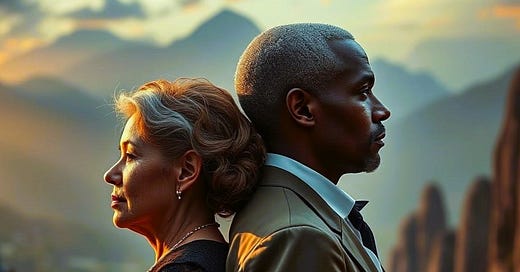A Two-Sided Reflection on Being Seen
Visibility Matters as We Age - by May More and Jesse Wilson for the KTHT writing prompt.
Facing the Mirror as Age Changes Me -
In a few years, I will leave my 50s behind with mixed feelings. Let me explain.
From around seventeen up until I turned fifty-five, I recognised that I was noticed wherever I went.
I was tall, confident, and attractive — visible.
Then when I reached my mid 50s, my periods stopped, and suddenly I felt less “vital.” No longer connected to the rhythm of life that had marked my youth and womanhood.
However, I was aware the impression I had of myself might have been hormonal, so tried not to dwell on it too much. But when a man who was part of my close circle said wryly, “You’re not relevant any more since you can’t have children,” my self-esteem took a dive.
Those words were like a slap across my cheek. They cracked my confidence. How dare he!
That moment changed how I saw myself and then right on queue I actually was seen less — not just by men, but by people around me in general.
His harsh comment seriously affected my identity for a while. I put too much weight on his words and started viewing myself as diminished, less than before — a non-essential.
I sat with that for some time while life continued.
But after a while I thought about my mother and grandmother, who were vibrant and fully themselves in their later years. Their sense of worth hadn’t depended on youth or fertility — they knew who they were.
I also listened more to my daughters’ compliments, to the praise I received from others on my writing, and slowly I raised my head up and looked people in the eye once more.
That made a difference.
Don’t get me wrong — I know I’ll never be as shiny or desired as I was in my youth and peak years. And that hurts! But I’ve learned the way I hold myself, and how I view my identity, shapes how others see me too. That shift helps me radiate positivity, rather than seek sympathy.
The experience of invisibility among older women is clearly cultural and learned. Media and advertising often sideline older women like me, shouting youth equals value and beauty. This influences how society treats us and in turn how we internalise our worth.
Yet older women have so much to offer — wisdom, wit, resilience. We’ve nurtured families, built careers, and been the backbone of communities. I hope society becomes more open-minded and begins to embrace, rather than hide and insult us, and finally sees and seize us for who we are, not just who we used to be.
Visibility is linked to identity, which can be buttressed with recognition and respect from every one of us. Let’s be part of that change!
May More Note: I often look at men and think how lucky they are to remain visible all their lives. But am I just assuming? I invited Jesse to share his thoughts.
Does Visibility Fade with Age, or Just Change Frequency? -
As a middle-aged Black British man, I am consciously aware of my visibility to others.
I have been for as long as I can remember because of where I - - live and work as one of few People of Colour. It is an awareness that sits at the forefront of my daily interactions.
Sometimes, my visibility plays to my advantage; I am noticed and remembered. I stand out from the crowd, and sometimes I am only remembered for the wrong reasons.
However, this essay is not about navigating visibility and race, although both are inextricably linked to our identities.
Over the years, I have had several indirect moments of thought and insights about visibility and ageing, but now, in writing this essay, I understand how my visibility has shifted, partly through my choices and actions and partly because of external factors.
I summarise the shift as a consequence of both a change in my physicality and utility.
To help explain, let me provide some context. This September will mark twenty-five years of marriage to my lovely wife, who occasionally likes to share endearing words about how she took one for the team.
Jokes aside, twenty-five years of marriage is a testament to my commitment and shift in perception to court and pay attention to the opposite sex.
As a consequence, I don’t frequent or move in the circles I once did, and with that comes less visibility and attention — which is by choice and a good thing.
That said, I have noticed with my silver highlights, reduced muscular frame, I perhaps project a different type of confidence.
I certainly receive less attention and wonder if that is a combination of the truth that we attract what we give attention to, coupled with how we are seen.
From a utility perspective, I believe moving through the stages of being nurtured to nurturing affects how we are seen.
When I was young, I remember how I was the centre of the world of extended family members, grandparents, uncles and aunts. Now that I am older, that type of visibility has changed.
No more birthday cards and gifts, I am expected to uphold and be whatever definition of a man society bestows upon me.
I am fortunate to have a family of my own and understand expectations and gravity rightfully shift.
I recall a time last year when our youngest went to University and I returned to a quiet family home — my wife, our pet dog and I.
It prompted me to consider the shift that occurs when your offspring exercises their independence.
On the one hand, you take comfort knowing your children are reasonably equipped to navigate the world on their own, and on the other, you notice more how rooms in your house echo at the slightest noise.
As a man, just as soon as you recognise those feelings, you also know that few men talk about it, and there are few places where you can.
In as much as our visibility is entwined with our identities, I believe it is also a product of where and what we give our attention.
Perhaps visibility doesn’t fade — it changes frequency. We take it for granted when we are young, but in truth, it is like a skill; we must evolve and learn to see ourselves differently.
We hope you enjoyed our collaboration. If you did, you may also like this from
and






This was such an interesting read! It made me consider a lot of things from the female and male perspectives, and how we are really more alike than most people would think. We all crave to be seen and heard, no matter gender or age. I think the key part is to first see and value ourselves for all our fascinating aspects, and embrace our ever-changing selves.
This is a fascinating article, seeing it from two different perspectives. It definitely made me look at myself (female, same age range as May) and I realized I have never even thought about how visible I am. Not at this age, but not at any age. To be honest, in my daily life, I never really wanted to be visible; I preferred to blend in. It might be different for my online persona...